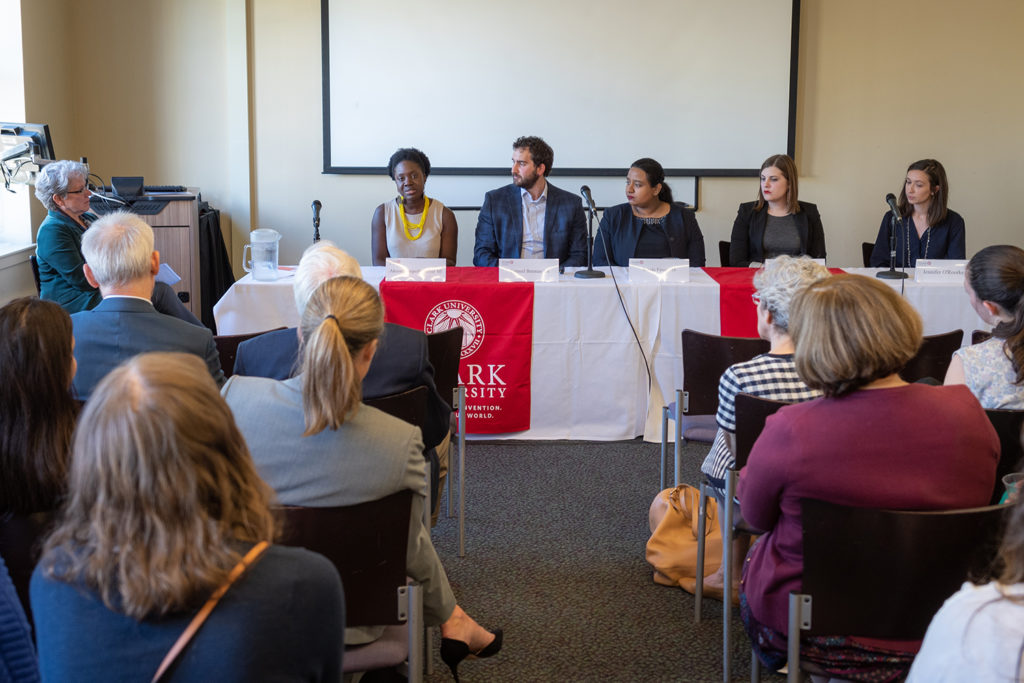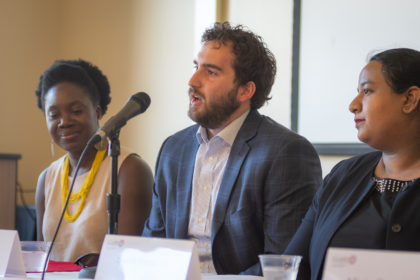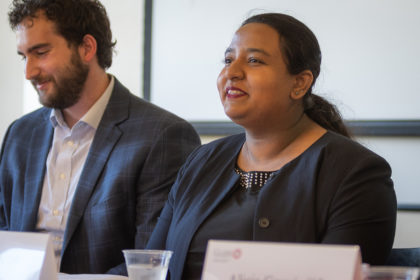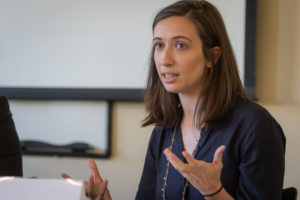Alumni panel brings advice, insight to Academic Spree Day 2019

Be open to accepting a job that has no obvious connection to your major.
Try things that take you outside your comfort zone.
And network, network, network.
A panel of alumni delivered this advice to Clark students at a special Academic Spree Day event honoring the legacy of the Steinbrecher and Anton Fellows Society. Akosua Ampofo Siever ’05, Samuel L. Berman ’14, M.S. ’15, Suaida Firoze ’16, Alicia Gauvin ’12, and Jennifer K. O’Rourke ’14 described the internships they held as Steinbrecher fellows, and shared how those experiences broadened their perspectives on the world and continue to impact their lives and careers today.

The panelists lauded Clark for providing an intensive academic experience and substantial opportunities to apply what they learned in settings beyond the classroom.
“I spent my entire time at Clark trying to figure out how to get out of the classroom,” Berman laughed. I’m one of those people who has to see it, touch it, visualize it. Clark offered me the flexibility to find my path.” Berman’s Steinbrecher fellowship sent the environmental science major into the ice caves of Siberia, where he worked on a renewable energy project funded by the National Science Foundation. Today, he’s a market analyst at Enel Green Power in the Boston area.
Firoze, who conducted interviews with survivors of sexual violence in Bangladesh, said the experience helped teach her that when you advocate for a person, a cause, or a client, you do so wholeheartedly. It’s an ideal she has carried with her into her job as a consultant with Deloitte in New York, where she assesses regulatory and operational risk.

“Clark teaches you how to fight for the things you believe in. That’s my cornerstone, my strength,” Firoze said. “We always tried to do things beyond what we were taught in the classroom.”
As executive director of the Center for Sexual Pleasure and Health in Providence, R.I., Gauvin provides “relevant and medically accurate information and training” to many audiences, from college students to medical professionals. She found her undergraduate courses at Clark more relevant to her professional aspirations than the classes she took in graduate school.
The classroom was a focal point for O’Rourke, a history major who now works as a marketing and membership coordinator at the Unitarian Universalist Service Committee. She said faculty mentorship was key for her. “I remember talking about my thesis with [Professor] Ousmane Power-Greene for two hours. That conversation made it better,” she said.
Siever, whose fellowship involved interviewing survivors of the Rwanda genocide, advised students to embrace moments of community, the “random late-night conversations” with fellow Clark students that evolved into enduring friendships. “Community is very important to me,” she said. “Those relationships are still going strong.” Today, she is a facilitator for community initiatives at Root Capital, working on economic strategies to empower people who are often overlooked and underserved.
Berman recalled working in a retail job shortly after graduation, something that wasn’t part of his long-range plans, yet still provided value.

“Often it’s not what you know, but how you communicate,” he said. “You’re never going to perfectly fit into a job description, so do things you’re not always fully comfortable with. Challenge yourself.”
Always be networking, the panelists stressed. O’Rourke said she makes sure to attend networking events and to serve in leadership positions on boards. The retail position Berman held led him into conversations with many different people, including someone who supplied him with a key contact in his field.
It’s important to know that what you think you want to do with your life can change dramatically from when you enter college to when you leave, Gauvin said. And be open to hearing opinions that differ from your own, “rather than shutting down the conversation.”
Prior to a question-and-answer session with the audience, fellowship benefactor Stephen Steinbrecher ’55 told the panelists that Clark “embraced me and allowed me to struggle” as he found his academic footing. Listening to the alumni describe their professional and personal journeys left him in awe, he said.


